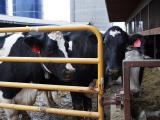Jan 30, 2013
H5N1 confirmed in village poultry where girl died recently
Cambodian officials have confirmed an outbreak of H5N1 avian flu in backyard poultry in a village where a young girl died of the disease this week, according to a report filed with the World Organization for Animal Health (OIE) today. The outbreak began Jan 9, killed 67 birds, and led to the culling of 436 others in Prey Nheat village in Kampong Speu province not far from Phnom Penh. Officials have also curbed movement of poultry in the area and have disinfected the affected premises, the report said. Yesterday Cambodia's Ministry of Health confirmed that a 17-month-old girl from the village died of H5N1 avian flu on Jan 28, and last week the agency reported that a 35-year-old man from an unspecified area of Kampong Speu died from the disease on Jan 21.
Jan 30 OIE report
Jan 29 CIDRAP
News item on girl's death
Genetic variant linked to severe flu in Chinese patients
People in China may carry a genetic variant that makes them more susceptible to severe disease when they contract influenza, according to a study yesterday in Nature Communications. Chinese and UK researchers analyzed data from patients at a Beijing hospital from June 2009 to January 2010 for the effect of the variant, or allele, called rs12252-C, on flu severity. The allele is found in about 3% of Northern Europeans, the authors say, compared with about 50% of the Han Chinese population. The researchers found the rs12252-C allele in 22 of 32 patients (69%) who had severe 2009 pandemic H1N1 (pH1N1) infections and in 10 of 13 (77%) who died. In contrast, 13 of 51 (25%) who had mild pH1N1 infection had the allele. This finding echoes the results of an earlier study in Europeans, they wrote. "Understanding why some people may be worse affected than others is crucial in improving our ability to manage flu epidemics and to
prevent people dying from the virus," said lead author Tao Dong, PhD, of Oxford University in an Oxford news release.
Jan 29 Nat Commun report
Jan 29 Oxford news release
FDA warns supplement maker over flu-fighting claims
The US Food and Drug Administration (FDA) and the Federal Trade Commission (FTC) have warned the Boca Raton, Fla., maker of a supplement called GermBullet that it is violating the Federal Food, Drug, and Cosmetic Act based on its marketing claims. Flu and Cold Defense, LLC, says on its Web site that the inhaled product is a proprietary blend of 11 botanicals. In a Jan 24 letter to the company, the FDA said its investigation of the company's marketing claims suggests it is intended to prevent, treat, or cure disease, which would appear to classify it as a drug. The FDA also said the company has made false and misleading claims for the product on its Web site, for example, that an FDA-recognized lab has tested GermBullet and confirmed its ability to kill cold and flu viruses. "However, FDA has not 'recognized' any virology lab that has independently tested your product," the letter states. The letter also said that advertising that a
product can treat or cure disease without citing reliable scientific evidence violates the FTC Act. Failure to promptly correct the violations may prompt federal officials to take additional legal steps such as filing an injunction and seizing the products, according to the letter. The FDA asked the company to respond in 15 days.
Jan 24 FDA warning letter



















